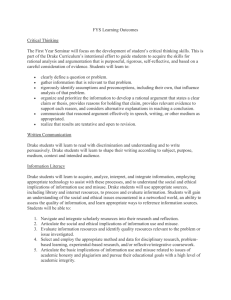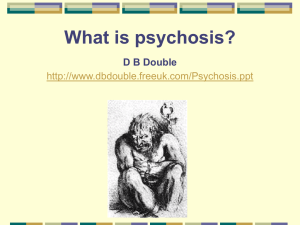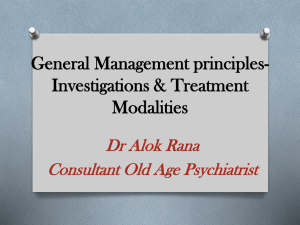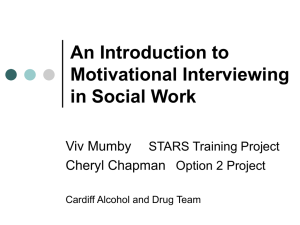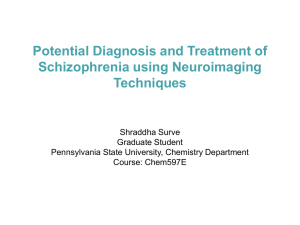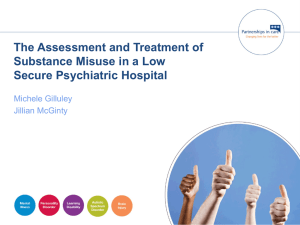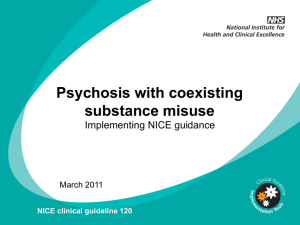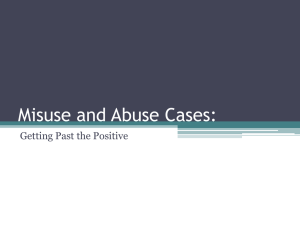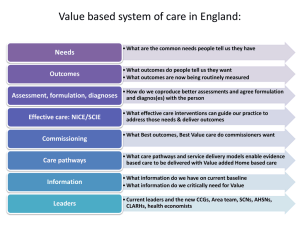et al - Scottish Association for Mental Health
advertisement
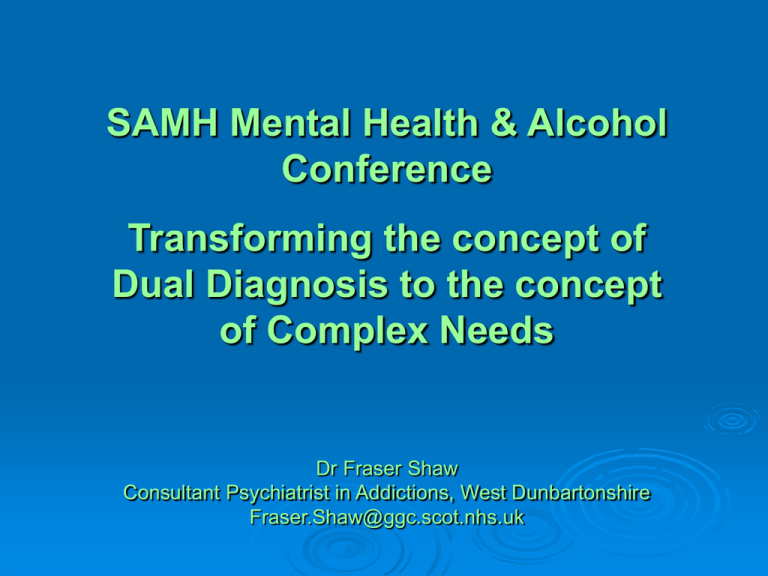
SAMH Mental Health & Alcohol Conference Transforming the concept of Dual Diagnosis to the concept of Complex Needs Dr Fraser Shaw Consultant Psychiatrist in Addictions, West Dunbartonshire Fraser.Shaw@ggc.scot.nhs.uk What is ‘dual diagnosis’ or ‘comorbidity’? Two overlapping but discernible subgroups of patients:• Those with a major substance misuse disorder and another major psychiatric illness. • Those who use alcohol and/or drugs in ways that affect course and treatment of their mental illness. (Guehaly, 1990) Prevalence Depends on who is asking, how, what, where etc! • OPCS institutional survey, UK (Farrell et al 1998) - 7% of those with schizophrenia reported ‘ever’ using drugs. • Croydon, UK outpatients (Wright et al 2000) - 33% lifetime, 10% current prevalence of ‘substance misuse’ in cohort with regular CMHT contact. • Inner city USA inpatients (Brady et al 1991) 64% lifetime prevalence of ‘substance abuse’. Prevalence of Dual Diagnosis (The Royal College of Psychiatrists’ Research Unit) Authors Date Location Population Lifetime rate of substance use Current rate of substance use Drake & Wallach 1989 USA Chronic Mental Health Problems 32% Regier et al. 1990 USA Schizophrenia 47% Barbee 1989 USA All Patients 47% Duke 1994 UK Schizophrenia & Alcohol 22% 36.6% Menezes 1996 UK Psychosis 32% 60% Fowler 1998 Australia Schizophrenia 27% Scott 1999 UK Psychosis Cantwell 1999 UK 1st Episode Psychosis Wright 2000 UK Psychosis 37% 20% drugs 12% alcohol 33% 13% • Bipolar disorder has the greatest risk of any Axis 1 disorder for substance misuse comorbidity. • People with schizophrenia three times more likely than those without to abuse alcohol, six times more likely to abuse drugs. • Comorbid schizophrenics have higher rates of inpatient care and intensive crisis support. “Mental disorder and substance misuse sit on separate dimensions each with its own continuum of severity from mild to severe levels.” Banerjee , Clancy and Crome (Eds), (2002) The Royal College of Psychiatrists’ Research Unit ASSESSMENT: SPECTRUM OF CO-MORBIDITY Severity of problematic drug use HIGH Dependent drinker who experiences increasing anxiety Person with schizophrenia who misuses Cannabis on a daily basis to compensate for social isolation Severity of mental illness LOW HIGH Recreational misuser of dance drugs who has begun to struggle with low mood after weekend use Person with bi-polar disorder whose occasional binge drinking & experimental use of other substances de-stabilises their mental health LOW Adapted from DOH Dual Diagnosis Good Practice Guide Available from www.doh.gov.uk/mentalhealth Why is co-morbidity important? Vulnerability: • • • • • • Homelessness or unstable housing Interpersonal conflict and family problems Violence Victim of crime History of sexual, physical and/or emotional abuse Suicide and self-harm • • • • • Poor compliance with medication Treatment recidivism Poor prognosis of mental health problems Increased criminal justice system contact Early mortality (Drake et al.,1998; Drake et al., 2001; Banerjee et al. (Eds.), 2002) Integrated treatment • Presents fewer hurdles to treatment access for patients with co-morbidity • Better retention in treatment • Potential to reduce substance misuse and attain remission • Improved psychological functioning (Drake et al., 1998, Drake & Mueser, 2000; Mueser et al., 1998). Components of effective integrated treatment approaches • Close monitoring • Case management • Assertive outreach • Comprehensive treatment • Stepped Care • Motivation based intervention • Longitudinal perspective (Drake et al., 1993; Mueser & Drake, 2003) Comorbidity, Dual Diagnosis (blah blah.....) Transform to:- - Complex needs - Recovery Agenda Complex Needs • Mental health problems • Substance misuse problems • Traumatic brain injury/head in jury • Learning disability • Literacy and communication skills • Personality disorder • History of trauma Complex Needs II • Attention deficit hyperactivity disorder • Chronic pain • Sleep disorders • Homelessness • Involvement with criminal justice system Complex Needs III Alcohol use: • In a general UK population, 40% said alcohol made them feel less anxious, 26% said less depressed. • Up to 65% of suicides have been linked to excessive alcohol use. • Specific anxiety disorders and/or depression were found to be related to frequent and/or heavy alcohol misuse in a primary care setting. • Alcohol and/or drug misuse correlated with more frequent hospitalisations for patients with schizophrenia. Complex Needs IV Benzodiazepine use: • Frequent accompaniment to alcohol misuse. • Anterograde amnesia associated with benzodiazepine use will impact processing and retention of interventions. • Effectiveness of CBT-based interventions reduced with benzodiazepine use. • Mounting evidence for persistent cognitive deficits in chronic benzodiazepine use. Other drug use: • Study of methadone maintenance patients found impairment across all cognitive domains. Lifetime diagnosis of alcohol dependence, and number of non-fatal heroin overdoses, were independent predictors.
